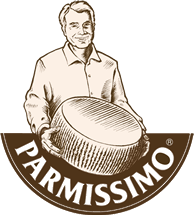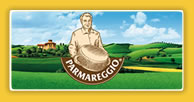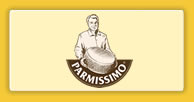 Nutritional - the connoisseur
Nutritional - the connoisseurFollow me and discover the tasty world of Parmigiano Reggiano, a food whose nutritional qualities make it suitable for people of all ages. I'll tell you about when Parmigiano Reggiano was born, about 900 years ago. A story of time-honoured taste.
Parmigiano Reggiano on the table
Parmigiano Reggiano is, without a shadow of a doubt, the king of cheese and its 800 years of history represents its tradition.
Despite the great popularity of this extraordinary product, not everyone knows that Parmigiano Reggiano has exceptional nutritional and culinary properties.
This hard cheese undergoes a long maturation process and is rich in proteins, vitamins and minerals and lactose-free.
Fat in dry matter min.32%
Click on the button for further information on the nutrient
for further information on the nutrient
Parmigiano Reggiano is, without a shadow of a doubt, the king of cheese and its 800 years of history represents its tradition.
Despite the great popularity of this extraordinary product, not everyone knows that Parmigiano Reggiano has exceptional nutritional and culinary properties.
This hard cheese undergoes a long maturation process and is rich in proteins, vitamins and minerals and lactose-free.
Fat in dry matter min.32%
Click on the button
 for further information on the nutrient
for further information on the nutrient
Essential amino acids make it easily
assimilated, whereas the enzymes it contains make it highly digestible and, therefore, suitable even for those who have cow's milk protein intolerance.
Just think that 50-60g of Parmigiano Reggiano, perhaps a nice flake of a 30 month-old Parmareggio, eaten during a meal, provide 16g of proteins i.e., approximately those contained in 100g of fish or meat; therefore, given the same protein intake, there is a significantly lower cholesterol level compared to veal or white meat commonly recommended in diets.
Even Ersilia, who is always worried about her figure and follows a low-calorie diet, enjoys Parmigiano Reggiano, which ensures a lower calorie intake with the right nutritional intake: 50g of Parmigiano Reggiano with some seasonal vegetables and 50g of bread provide less than 400 calories and make an excellent meal.
Grated on the pasta is just perfect. Parmigiano Reggiano increases the palatability of the dish, stimulates gastric juices and promotes the digestive process... and most of all it makes you mouth water. 10g of Parmigiano Reggiano, the dose normally consumed with first courses, provide 4-5g of proteins, which correspond to the intake of approximately 35g of meat and fish.
Just think that 50-60g of Parmigiano Reggiano, perhaps a nice flake of a 30 month-old Parmareggio, eaten during a meal, provide 16g of proteins i.e., approximately those contained in 100g of fish or meat; therefore, given the same protein intake, there is a significantly lower cholesterol level compared to veal or white meat commonly recommended in diets.
Even Ersilia, who is always worried about her figure and follows a low-calorie diet, enjoys Parmigiano Reggiano, which ensures a lower calorie intake with the right nutritional intake: 50g of Parmigiano Reggiano with some seasonal vegetables and 50g of bread provide less than 400 calories and make an excellent meal.

Grated on the pasta is just perfect. Parmigiano Reggiano increases the palatability of the dish, stimulates gastric juices and promotes the digestive process... and most of all it makes you mouth water. 10g of Parmigiano Reggiano, the dose normally consumed with first courses, provide 4-5g of proteins, which correspond to the intake of approximately 35g of meat and fish.
















